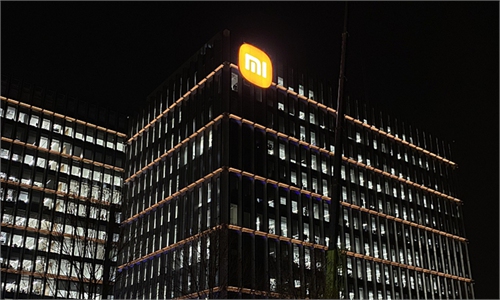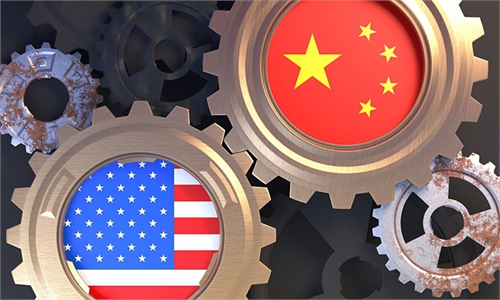Pentagon blacklists more Chinese firms for further sanctions, ‘move to end up hurting US investors’
Fresh crackdown to ‘contain China’s tech rise, will end up hurting own investors’

China US
The US Department of Defense (DOD) added more Chinese companies, including dronemaker DJI Technology and genomics firm BGI Genomics Co, to a blacklist on Thursday, claiming they have ties to the Chinese military and paving the way for further restrictions on their businesses.
Chinese experts said that the fresh move, which lacks evidence and comes amid a heightened China-US tech rivalry, is another strengthened and baseless crackdown on China's technology rise that will end up "lifting a rock only to drop it on its own feet."
According to a statement published on the official website of the DOD, firms included in the list are "Chinese military companies" operating directly or indirectly in the US in accordance with the statutory requirement of Section 1260H of the National Defense Authorization Act for Fiscal Year 2021.
Surveillance equipment maker Zhejiang Dahua Technology, China State Construction Group Co and rolling stock manufacturer CRRC Corp Ltd were among the 13 firms added to the blacklist.
"The Department is determined to highlight and counter the People's Republic of China's Military-Civil Fusion strategy, which supports the modernization goals of the People's Liberation Army by ensuring its access to advanced technologies and expertise are acquired and developed by PRC companies, universities, and research programs that appear to be civilian entities," the Pentagon said in the statement.
The fresh move represents the US' aim of seeking a more comprehensive and in-depth strategy to "compete" with China, especially in the high-tech sector, as most of the sanctioned firms represent China's technological and comprehensive strength, which the US feels "threatened" by, experts said.
"It can only be said that the list is another of Washington's excuses to suppress China's scientific and technological progress and industrial upgrading," Gao Lingyun, an expert at the Chinese Academy of Social Sciences in Beijing, told the Global Times on Friday.
The new list is an expanded version of the initial one released on June 3 last year. The Pentagon said it "will continue to update the list with additional entities as appropriate."
The first tranche contained 47 firms including Huawei Technologies and China's three biggest telecommunications companies. Under an executive order signed by US President Joe Biden, US investors will be banned from buying or selling publicly traded securities from those companies.
In response to Biden's move, Wang Wenbin, a Chinese Foreign Ministry spokesperson, said at the time that China will take necessary measures to safeguard the legitimate rights and interests of Chinese companies and firmly supports them in protecting their own rights in accordance with the law, and urged the US to respect market laws and principles and withdraw the investment ban list.
The Pentagon did not elaborate on the coming restrictions on the new tranche of firms in the Thursday statement, but experts said that the US Commerce Department may be the next to announce restrictions that could steer US investment away from these companies.
From the perspective of Chinese businesses, short-term pain such as a shift of business strategy in the US is inevitable, but the long-term impact will be rather limited, Gao said.
He Weiwen, a former economic and commercial counselor at the Chinese consulate general in San Francisco and New York, told the Global Times in a previous interview that the main limitation of the investment ban is that US investors cannot directly invest in those Chinese firms. Chinese companies on the list cannot publicly raise funds in the US market.
"Seen from public data, however, US direct investment in China only accounts for 2 percent of China's foreign investment; that is, about $2.6 billion, so the impact is slight," He said, adding that the ban's impact on indirect investment needs further observation.
However, the broader ban will surely "lift a rock only to drop it on its own feet in the end" for the US government and American investors, given that entities on the list are all firms with great prospects and high yields, Gao said.
More investors from other countries can "jump on the boat" and share dividends, the expert noted.
Gao also advised relevant companies on the list to seek a reversal of restrictions through legal means and fight for their legitimate rights, given some Chinese firms' previous successful experience.
For instance, Chinese smartphone maker Xiaomi said in May last year that it had been formally removed from the US government blacklist after filing a lawsuit.
According to a final order issued by the US District Court for the District of Columbia, it vacated the US DOD's designation of Xiaomi as a "Communist Chinese Military Company" (CCMC), and the court formally lifted all restrictions on US persons' ability to purchase or hold securities of the company.
"More firms can follow suit and challenge discriminatory US administrative orders or reckless bans," Gao told the Global Times.
The Global Times contacted DJI, BGI and CRRC for comment, but none of them had replied as of press time on Friday.


